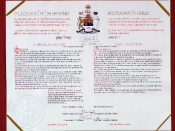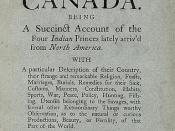Before 1982, Canada's constitution was the British North America Act. Any changes to this constitution required the approval of the British government. For years, Canadian
governments had considered patriating the constitution, but no agreement could be reached pertaining to the changes. In 1981, Prime Minister Pierre Elliot Trudeau decided it was time to act upon the ideas of his predecessors; thus, work started on the creation of a new Canadian constitution.
Less than a month after the Quebec referendum, Trudeau organized a conference with the provincial premiers; however, the premiers could not agree on a od of revising the
constitution. With this problem impeding his progress, Trudeau announced to the Canadian public, his government's intention to unilaterally work on patriating the constitution.
In early November, 1981, Trudeau made a final effort to involve the provincial premiers in the patriation process. At the last moment, an agreement between the provincial and federal governments, save for Quebec, was successfully employed.
On December 2, 1981, the federal Parliament voted in favour of the patriation package. This event seemed to reflect Canada's blossoming self-identity.
A Canadian delegation went to London, England, to seek approval of the patriation package from the British Parliament. The delegation was granted its request on March 8, 1982; thus, Canada?s status as a fully independent nation was recognized. This event was one of the most significant defining moments in Canadian history, because it gave Canada complete autonomy from Britain, by allowing Canada to amend and manage its own constitution.



Very Nice
I believe that this essay was well writen and well planed. It shows the facts that the writer has collected, plus the view that the writer has on the facts. When put together, it shows true tallent the the writer is able to display. It grabs attention of readers alike, grabs interest, and informs. This was well written and i hope to see more essays written by this writer.
Emargo
9 out of 9 people found this comment useful.